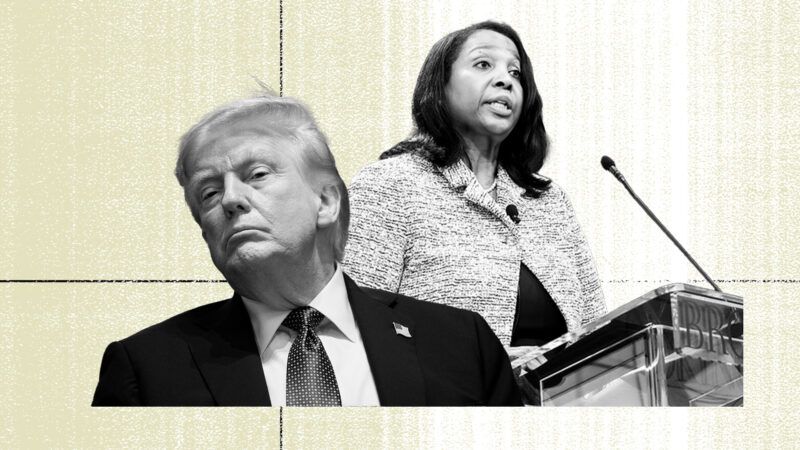Will SCOTUS Let Trump Fire Lisa Cook From the Federal Reserve?
Or will the justices say that Trump fired her for illegal reasons?

President Donald Trump has purported to fire Lisa Cook from her position as a member of the Federal Reserve's Board of Governors.
Can he lawfully do that? Or, perhaps the better question to ask: Will the U.S. Supreme Court let him do that?
You’re reading Injustice System from Damon Root and Reason. Get more of Damon’s commentary on constitutional law and American history.
Before tackling those questions, let's review what the Supreme Court has previously said about the president's power to remove federal agency heads such as Cook.
In Humphrey's Executor v. United States (1935), the Supreme Court unanimously rejected President Franklin Roosevelt's attempted firing of a commissioner of the Federal Trade Commission. That 1935 precedent was long understood as a flat prohibition against the president being able to fire the heads of "independent" federal agencies at will.
But in Seila Law v. Consumer Financial Protection Bureau (2020), the Supreme Court trimmed back Humphrey's Executor and gave more firing power to the president. At issue in that case was whether Trump had the authority to remove the director of the Consumer Financial Protection Bureau (CFPB) at will. Because the CFPB's director was "vested with significant executive power," the 5–4 majority held, that official ought to be subjected to the president's "power to remove—and thus supervise—those who wield executive power on his behalf."
Seila Law also played a starring role earlier this year in the Supreme Court's unsigned emergency order in Trump v. Wilcox, which allowed Trump's firing of National Labor Relations Board member Gwynne Wilcox to go into effect while Wilcox's lawsuit against Trump played out in court.
"Because the Constitution vests the executive power in the President," the order stated, "he may remove without cause executive officers who exercise that power on his behalf, subject to narrow exceptions recognized by our precedents." Furthermore, the order said, "the Government is likely to show" that the National Labor Relations Board does "exercise considerable executive power."
Which brings us back to the Federal Reserve. On the surface, the Fed might seem like the sort of federal agency "vested with significant executive power" that now falls under the Supreme Court's more executive-friendly decision in Seila Law, rather than under the previous, more executive-constraining decision in Humphrey's Executor.
But Trump v. Wilcox also contained an explicit carve-out for the Fed. "Respondents Gwynne Wilcox and Cathy Harris contend that arguments in this case necessarily implicate the constitutionality of for-cause removal protections for members of the Federal Reserve's Board of Governors," the Court's unsigned order stated. "We disagree. The Federal Reserve is a uniquely structured, quasi-private entity that follows in the distinct historical tradition of the First and Second Banks of the United States."
In other words, Trump may not fire Lisa Cook from the Federal Reserve's Board of Governors at will. Which is another way of saying that Trump may not fire her simply because he would prefer to have someone else sitting in her position whose views align more closely with his own views.
But the Federal Reserve Act does say that the president may remove a member of the Fed's Board of Governors "for cause."
"I have determined that there is sufficient cause to remove you from your position," Trump told Cook, claiming there is "sufficient reason to believe [Cook] may have made false statements on one or more mortgage agreements."
To be clear, Cook has not yet been formally charged, let alone convicted, of any such wrongdoing. At this point, it is merely an allegation that the president has leveled against her.
Is that enough to satisfy the "for cause" rule contained in the Federal Reserve Act? Or does "for cause" require something more substantial than a mere allegation of wrongdoing, such as a formal charge, or a conviction, or even something else?
Here's another question to ask: Is the mortgage fraud allegation that's been leveled against Cook merely a pretext designed to cover the fact that Trump is actually firing Cook for illegal political reasons?
Those are the big legal questions going forward as this matter proceeds towards its seemingly inevitable rendezvous with the Supreme Court. How the justices will answer those questions—and how much deference they extend to Trump—remains to be seen.
